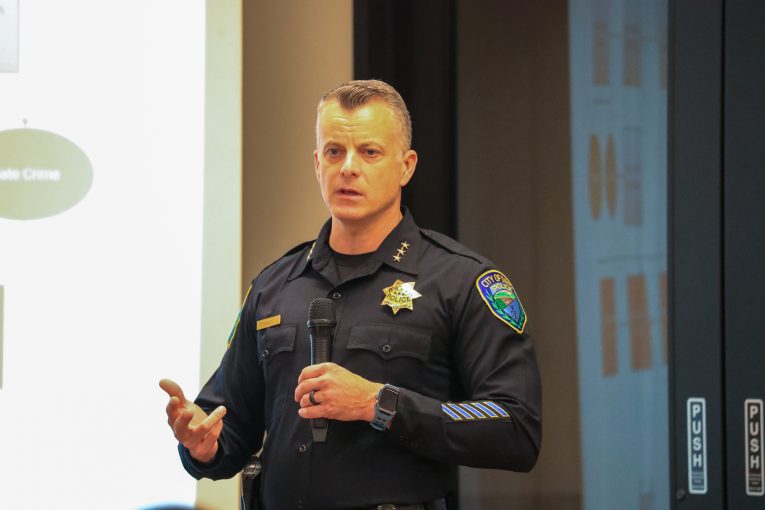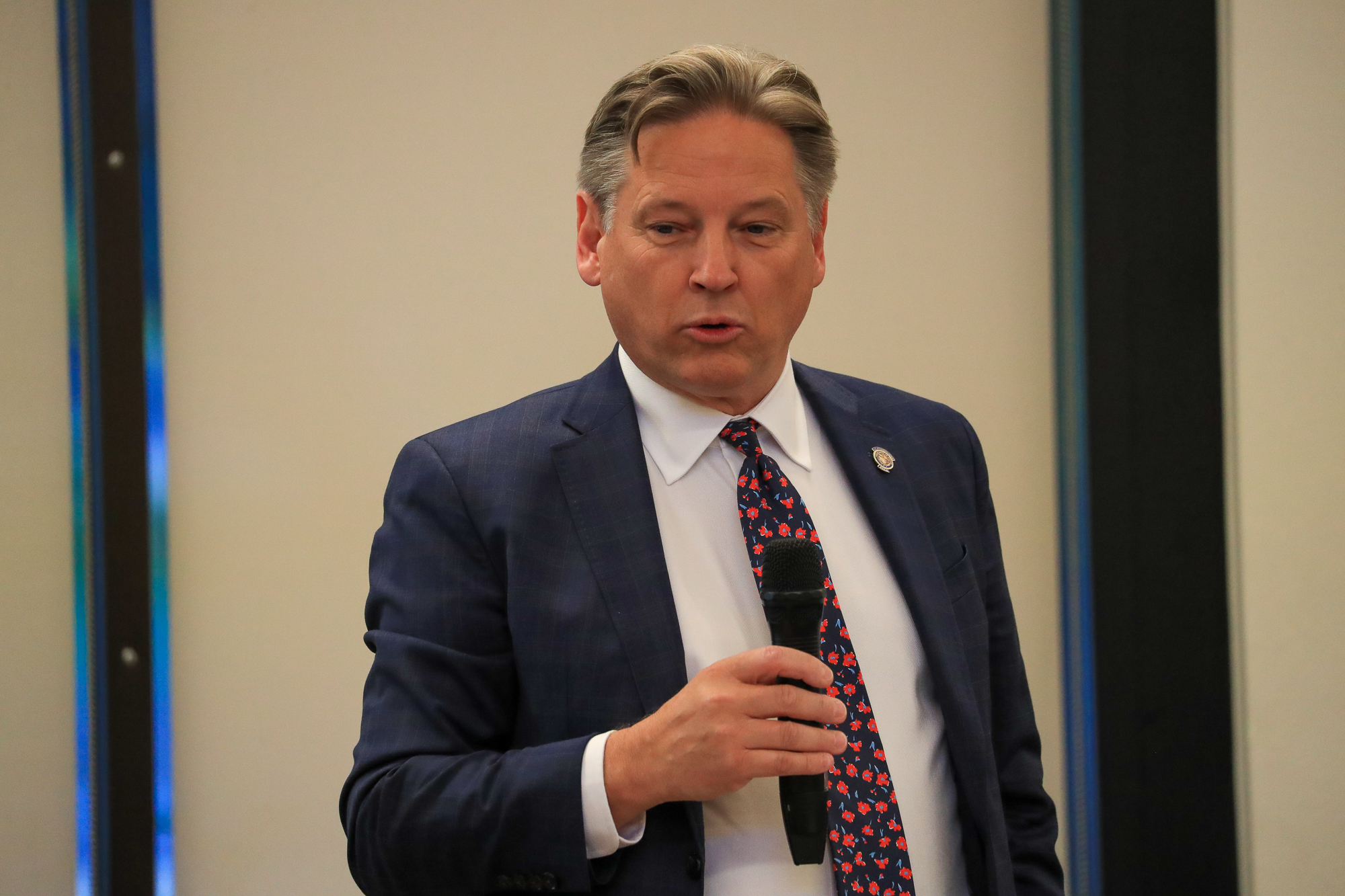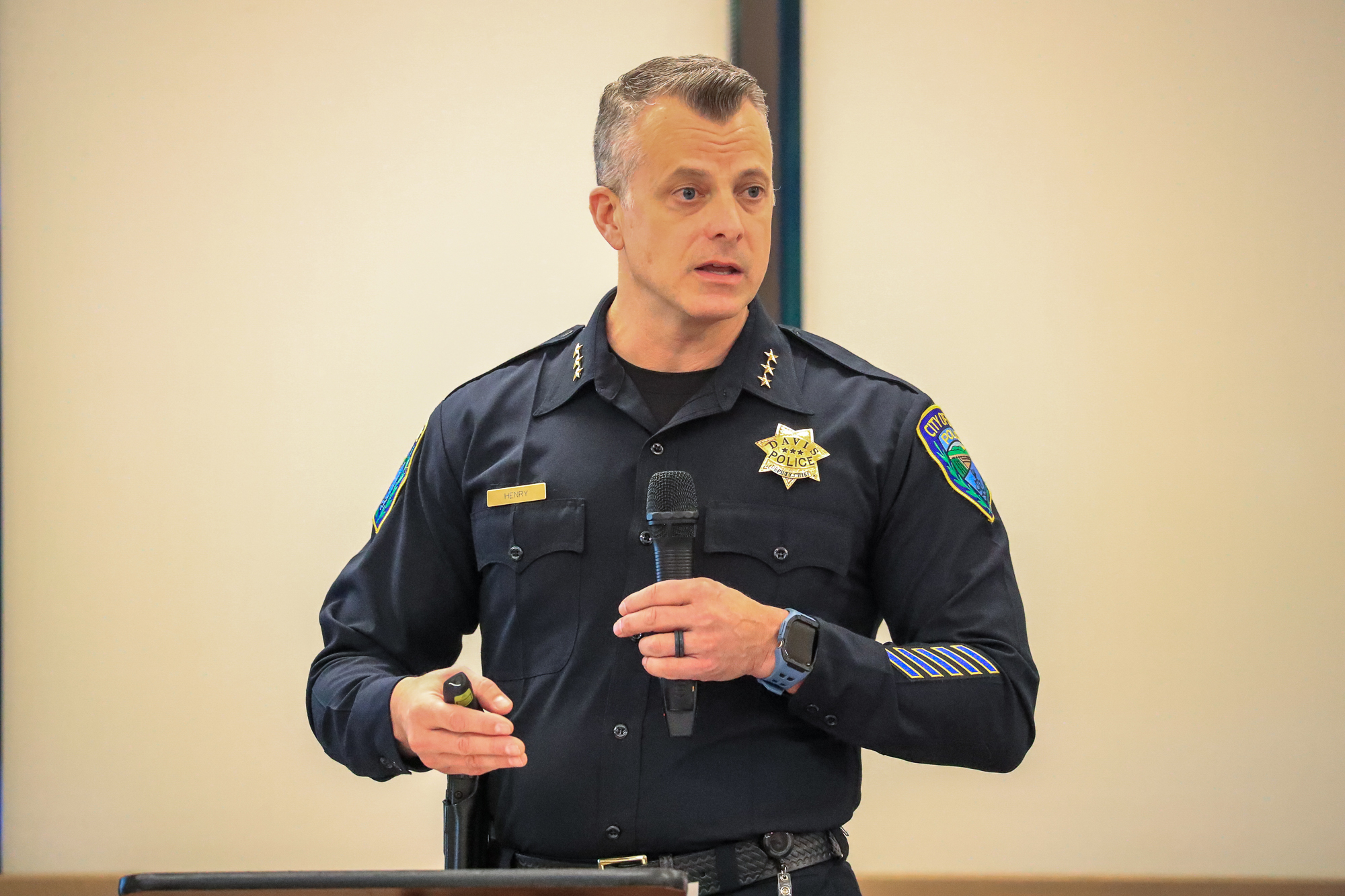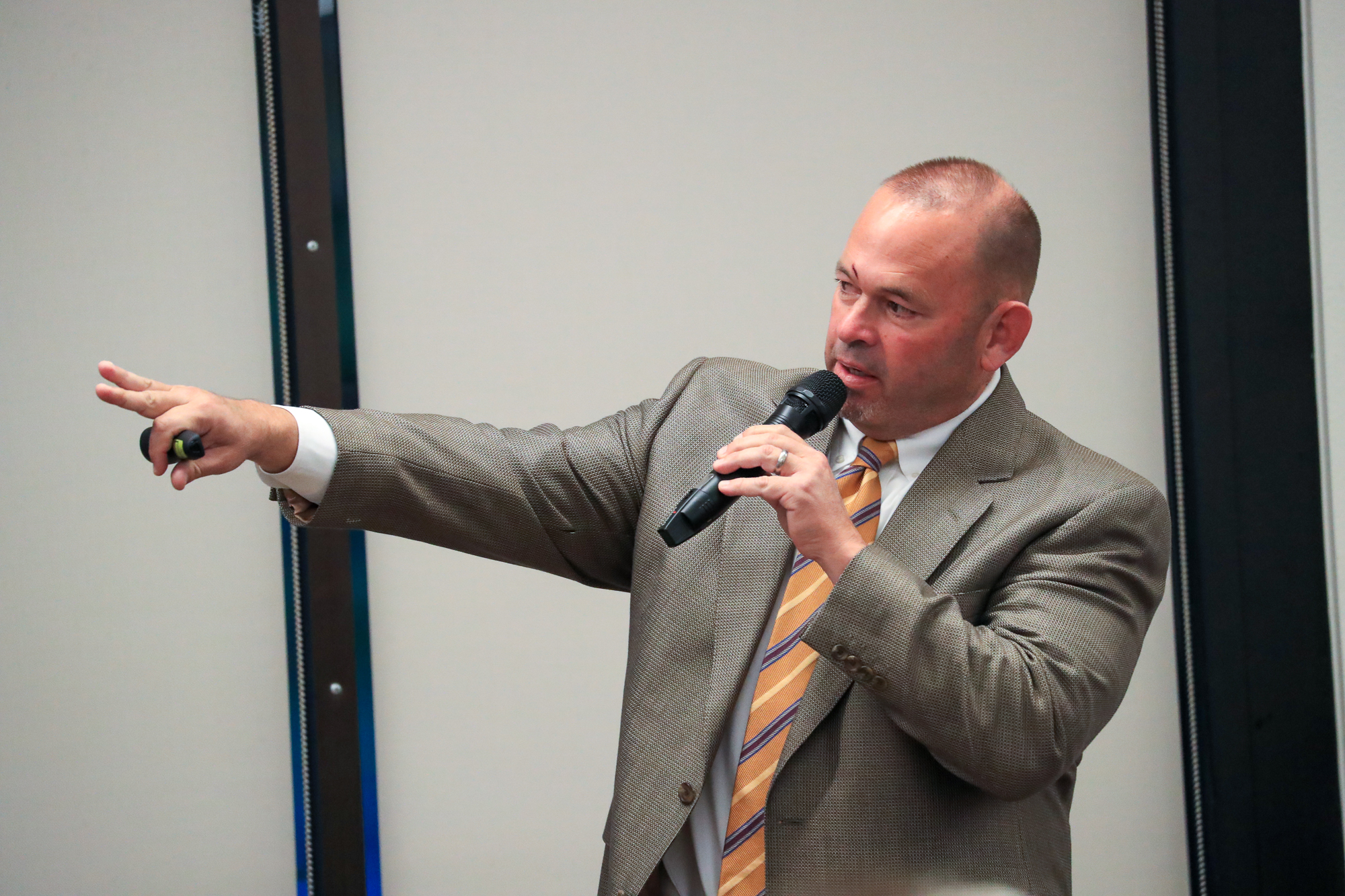

By David M. Greenwald
Executive Editor
Davis, CA – It was billed as a Communication and De-escalation forum at the Veterans Memorial in Davis on Monday night. Hosted by the US DOJ, it mainly took the form of a hate crimes information forum followed by community breakout sessions.
The breakout session moderator asked that the discussion not be recorded, but the session featured a hearty discussion on the recent bomb threats and impacts on the community and children.
There was a robust discussion in the group on the limits and boundaries of free speech—with some acknowledging that Moms for Liberty and their speaker at the library had the right to speak their mind, while others also noted that citizens have a duty to stand up and say that this is wrong and is opposed to community values.
At the same time, space was limited to 100 people—and the venue appeared to be at roughly half capacity. Many of the attendees were prominent people—in one breakout session there were several current and former elected officials, candidates for several offices, and county employees. Only a few of the participants were in fact private citizens—though one came up from Los Angeles apparently to express his dismay at the library session being shut down.
Mayor Will Arnold opened the meeting noting that the DOJ have “assisted all kinds of communities. This isn’t just unique to Davis. They assist community spacing conflicts to help develop solutions and enhance capacity and to help resolve conflicts. So we appreciate you all being here and working with us and this commitment to dialogue and to education.”
Mayor Arnold noted that this is his first year as Mayor in Davis, “We have experienced a lot in our community. We had a serial killer haunting our community in the spring. We had multiple bomb threats right here, right at our schools and library targeting individuals as well. And just recently, international issues have seeped into our community just today, in fact, we’ve seen hateful vandalism in our community, targeted in our Jewish community.”
The Mayor was referring to a Swastika found in West Davis on a freeway wall.
Phil Talbert, US Attorney for the Eastern District of California, noted that in addition to being a US Attorney, he’s a Davis resident and he has kids at the elementary school and high school on this very block.
He said, “So when the events surrounding the Yolo County Library were made known and the threats and schools had to be evacuated, those were the library and schools that our kids attended and spent time at when there was the serial killer earlier that was on bike paths and green belts that our kids have biked on that I’d run on for years and years and years.”
Talbert went on to describe in detail what a hate crime was and urged people: “What to do when a hate crime occurs? If you’re in the middle of it, call 911, get help. Afterward, we’re asking that you call your local police again, whether it’s the police department or the sheriff’s office, and also call the FBI.”
At the same time, he noted, “California has a fairly robust state hate crime law compared to other states.” He continued, “California’s hate crime law is strong. So often we will have a situation where an event happens. If it looks like it might be a crime motivated by hate, then you might have both the FBI and either the police department if it’s within the city limits or the sheriff’s office if it’s outside in the county investigating and cooperating at the same with respect to the same event.“

Sean Reagan, Special Agent with the FBI, discussed the role of the FBI in investigating hate crimes. He emphasized the importance of communication and collaboration with local law enforcement agencies and other partners.
Reagan emphasized that they needed to protect the communities across the nation, “But doing so while ensuring that we are adhering to supporting defending the constitution, that’s even more difficult.”
He said, “Not only does the FBI Department of Justice have a responsibility to ensure that those rights are protected from others, others that are trying to infringe on our rise, either through a crime or some other form of discrimination, somewhat other form of illegal act. But we also have to ensure that we, the FBI, federal government, local police, local government, does not infringe upon our rights as citizens, our constitutionally protected rights.”
He also noted that the challenge happens when hate is being spewed by individuals who “haven’t actually committed a crime.”
“They haven’t done anything,” he said. “Freedom of speech to express themselves, which is constitutionally protected and lawful. But we as a community are concerned that this person didn’t previously act like that previously, didn’t say these things, and now seems to be filled with this hate.”
He added, “Law enforcement, we can’t investigate a crime that hasn’t occurred yet. So there’s the dilemma. So the challenge for us as a community is what do we do outside the law enforcement perspective. Law enforcement can be part of the solution, but what do we do as a community to try to intervene in that potential suspect’s life, so to speak?”

Davis Deputy Police Chief Todd Henry noted the protocol upon receiving a bomb threat.
“As I mentioned earlier, this has obviously been a topic of huge public interest and one of the primary questions has been asked of us as a police department is how do you actually respond to this? What does this look like from the perspective of law enforcement?” Henry said.
Upon receiving a bomb threat, the police communicates with DJUSD administration, assesses the threat for actionable information, and notifies additional resources (i.e. other agencies) if needed.
Patrol officers respond to search the identified locations and determine whether they can declare the area safe. If appropriate, they can release public notifications and forward the case to investigations for follow up.
They can also alert the FBI if the need for additional resources is called for as well as to provide them information.

Assistant Supervising Deputy DA Garrett Hamilton discussed hate crimes in the context of state court in California.
He explained the difference between hate crimes and hate incidents and provided examples of each.
A hate incident, he explained, “is a non-criminal conduct, which is motivated by hatred, prejudice, or bigotry and directed at any individual residence or house of worship institution or business expressly because of the victim’s person or institution, real or perceived race, nationality, ethnicity, and so on.”
He said, “But the key point here is it’s not criminal conduct or a hate incident could be criminal conduct, which is motivated by bias, but does not meet the burden required by the criminal statute. And this is where the police, the sheriffs, and the DA’s have to really crunch through and evaluate the evidence that’s in the case to see if the criminal conduct was motivated by hate within the meeting of the statutes”


I wonder if the DOJ might consider it a hate crime when protesters try to shut down free speech on the UC Davis campus by blocking the entrance to the venue and smashing on doors and windows with steel barriers as has happened in the past?
Maybe the DOJ should be present on campus on Nov. 3 Wednesday night for the Riley Gaines event.
Under what definition of hate crime would that fall?
I don’t know, but with the ever broadening definition of what a hate crime is maybe forcefully shutting down constitutional free speech rights might qualify, or maybe soon one day will.
The state law is a bit broader, but the federal law: hate crime laws include crimes committed on the basis of the victim’s perceived or actual race, color, religion, national origin, sexual orientation, gender, gender identity, or disability.
State law: “A hate crime is a crime against a person, group, or property motivated by the victim’s real or perceived protected social group. You may be the victim of a hate crime if you have been targeted because of your actual or perceived: (1) disability, (2) gender, (3) nationality, (4) race or ethnicity, (5) religion, (6) sexual orientation, and (7) association with a person or group with one or more of these actual or perceived characteristics. Hate crimes are serious crimes that may result in imprisonment or jail time.”
I don’t see how what you describe would fit under either definition.
Well, maybe not classified as a hate crime but should still be a crime none the less. Do you not agree?
Not sure. Clearly if they did damage to the building, that would be criminal. But I am pretty sure violations of free speech are civil not criminal.
Trying to falsely assert a crime when none exists is a typical conservative tactic.
Smashing windows and pounding doors with steel barriers is a crime in anyone’s book, conservative or progressive.
If there’s property damage, I agree.
Then why were charges not pressed or anyone arrested?
Maybe they couldn’t identify who did it.
https://www.kcra.com/article/2-arrested-building-vandalized-uc-davis-event-conservative-activist/43326784
Keith – why are we talking about this?
Keith is desperately trying to divert attention from the Moms for Liberty and the Libs of TikTok.
Keith is just trying to point out that this kind of stuff comes in all shapes and sizes. It’s not just the right wing that Walter is always harping about.
There is no left wing equivalent for the dangerous Libs of TikTok.
That may be, but it also had nothing to do with the topic of conversation on Monday.